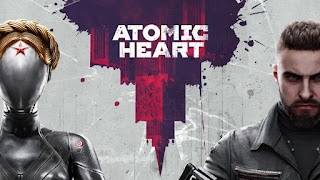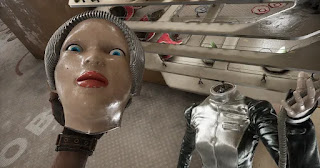Atomic Heart - Or How I Learned To Stop Worrying And Love The Bot
I'll be honest: I started playing Atomic Heart knowing absolutely nothing about it.
It took mere seconds for me to vividly flashback into Bioshock Infinite's Columbia. The whole -lengthy- introduction felt like a cross between BI and the original Half-Life, where a day in a (seemingly) idyllic location soon goes entirely to shit when robots go all Terminator meets I, Robot.
The premise of the game is, the Soviets came up on top after WWII, and soon established themselves as a utopia with crazy-advanced technology (especially robotics). But, things are not really as they seem beneath the surface, and the game soon begins showing clear influences from the original Bioshock's Rapture instead. Before expanding a little, though, I feel a disclaimer is in order.
I was unaware of the whole controversy around the game's finances and thematic concerns (those being that it's essentially Russian propaganda following the war in Ukraine) until after almost finishing it, but maybe because of this ignorance I was able to see it through a wholly unbiased lens. In my eyes, the story and plot is not pro-Russian propaganda and, if anything, it pokes quite a few pointed jabs and parody at the concealed rot and corruption in the Soviet system, even in a utopian fantasy. Individuality, free will and endangered human rights at the forefront of what the main character is fighting for, in spite of the system in place, in stark contrast of what is happening in the real world. To me it's no more propaganda than Red Alert's Soviets were, less humorous and tongue in cheek, perhaps, but certainly not defending the concept of a communist society in the way Soviets (and some modern Russians) meant it. As to the real-world financial implications regarding Mudfish (the Cyprus-based developer), where its funding came from and where the profits are going, I have not investigated enough to form an opinion.
The sound design of this game deserves a special note, which I don't usually do, simply because of how good it is for the most part, and how spectacularly bad and C-tier it becomes when it fails. The overall sound design of the game is pretty standard, but well thought out; you will soon learn to identify enemies and traps by sound alone. The music in the game, both ambient tone-setting pieces or singular tracks is...if not stellar, as close as it makes no difference. You will go from operatic arias (quite literally real opera music, such as Carmen), to Russian metal, to classical pieces like The Blue Danube or Swan Lake, to Russian techno-dubstep to Shostakovich pieces, sometimes aimed to get your adrenaline pumping, others to build atmosphere, and others simply to create memorable moments (such as surviving wave after wave of enemies until Habanera from the aforementioned Carmen ends). So far, so great!
But (and this is a big but), the voice-acting in the game is very hit and miss, and for the most part it's miss. There are not that many speaking characters for the majority of the game, and the biggest offender of them all is the main character's voiceover, with the voice artist performing a very good but entirely unfitting impersonation of male V from Cyberpunk 2077 (not his fault, as likely the culprit was the direction he was given). Other characters with lots of lines are not faring much better, with Granny Zina being the second worst and ill-fitting VO after P-3. Both their lines feel rushed, not fitting the environment and tone set by scenes and events, as if they were recorded in a vacuum with the actors not being given any context.
 |
| Scenes with both of them are especially bad |
I can't stress enough how jarring and off-putting this feels, and how much it ruins any atmosphere and immersion the game manages to eke out in other ways. I also find it hilarious that almost everyone speaks perfect American English with no hint of Russian accent, while every piece of writing in the game world uses the Cyrillic font, and the only person with a thick-ish accent is...the German guy. A special shout-out needs to go to the voice of NORA and the various robot voices in general, for standing above the mediocrity (and worse) of the rest.
And now, to the meat and potatoes of the game, the gameplay itself. At the start of this "review", I made some Bioshock comparisons. Turns out, I should keep making them, as the game is almost entirely built on the same formula gameplay-wise as well, with some bits and bobs added and removed at will, and slight influences from games such as Far Cry (3 and above) and Deus Ex.
In the heart of the game beats a pure, old fashioned story-based linear (for the most part) shooter. Add to that formula special powers such as Shok, Telekinesis and Frostbite, automated vendors that use scavenged materials to upgrade skills, powers and weapons or craft powerups, weapons, weapon upgrades and ammo, add "safe rooms" in which you will find said vending machines and save machines/terminals. Add frantic action setpieces alternating with tense and creepy exploration and painstaking ammo and resource conservation setpieces. Furthemore, add the premise of "wondrous retro sci-fi tech" that permeates the game, robotic enemies both humanoid and not, creepy plant mutants (yes, very Last of Us, and somehow very Stranger Things as well) and the exploration of abandoned environments where, essentially, all hell got loose and there are practically no friendly survivors, and yeah...with this recipe you will have a game that is, at its best, paying hommage to Bioshock and, at its worst, copying it.
Atomic Heart does neither.
While it has many interesting ideas, several memorable moments and action, and is definitely worth a playthrough, it's hardly a game you will crave to replay or think about much afterwards. When all is said and done, for a game called Atomic Heart, it has surprisingly little of it.














Comments
Post a Comment